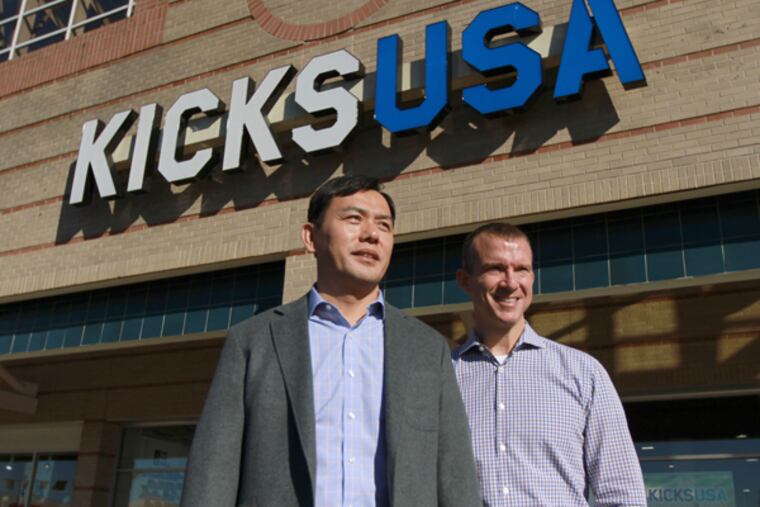A business of leaps and bounds
John Lee showed up for an interview about his sneaker empire wearing a pair of leather loafers. "I'm not in the culture," the 53-year-old president and owner of KicksUSA said unapologetically.

John Lee showed up for an interview about his sneaker empire wearing a pair of leather loafers.
"I'm not in the culture," the 53-year-old president and owner of KicksUSA said unapologetically.
But with 30 sneaker and athletic-apparel stores in the Philadelphia area, and plans to double that number in two to three years with an expansion into New York, Lee is most assuredly in the business of serving that culture.
It's a fanatical one. A limited-release shoe can trigger iPhonemania-like lines outside athletic-footwear stores like KicksUSA.
Sneaker obsession - with the most intensely afflicted buying not only to wear, but to collect - has been traced to 1985, when the Air Jordan I hit the market for $65. A pair now can sell for more than $1,000, depending on the condition and the seller.
It's a largely urban phenomenon. Don't underestimate the importance of the suburban sneaker fiend, though. With close to $100 million in annual sales - 75 percent from footwear - KicksUSA, which debuted in 2002, is predominantly in Philadelphia neighborhood strip centers. But a store opened earlier this month in Cherry Hill, and another will open in the middle of December in Willow Grove Park Mall.
KicksUSA is a company that not only survived the recession, but also boldly expanded during it, adding 15 new stores since 2008 - distinguishing them from competitors, in part, with bigger footprints and lots of color and light. A new technology initiative aimed at better serving customers will allow them to check, through in-store kiosks or online at www.kicksusa.com, which sneakers are in stock and where - and to order, pay, and make arrangements for pickup.
Lee said he was out to bust a faulty notion, in particular: "A lot of people think because we are an urban retailer, we don't invest, we're not innovative enough."
Inventory-tracking systems and eye-catching in-store displays are cool. Spend time with some of KicksUSA's 500-plus employees, however, and they rave most about its investment in them.
There's Crystal Morales, 19, from Northeast Philadelphia, a biology major at Temple University on the premed track. She started working for KicksUSA in October 2010 as a sales associate - and is now that and a cashier, mostly working weekends at the flagship Roosevelt Mall store because of her school workload.
Morales arrived at work one day in September to find a notice from the home office announcing an essay scholarship contest for employees with at least six consecutive months with the company and college plans.
Applicants were asked to describe "your most meaningful achievements and how they relate to your field of study and/or your future goals."
One of two daughters of a single mother, and worried about school expenses, Morales promptly started writing about her volunteer work at Bebashi-Transition to Hope, a nonprofit focused on sexual health, breast health, and hunger relief.
She won. Lee presented her with a $1,500 check in October and said something to her that meant as much as the money, maybe more, Morales said in an interview last week.
"He told me he was really proud of me," she said. "To have a male figure tell you something like that, it was really meaningful to me. . . . He's someone who makes you feel anything is possible."
That's also part of Lee's business plan. Married to a family practitioner and the father of three teenagers, the Newtown resident said he considers his family way bigger than that. It encompasses all his employees.
"I really wanted to build a company based on the family culture," he said.
That he gives each employee an iPad and $500 on his or her 10th anniversary with the company, and offers scholarships and internship programs, 401(k) matches and - to assistant managers and above only, at present - medical, dental, and life insurance benefits, is all part of building a culture that encourages employees to "get excited about coming to work," Lee said.
It's working, and one reason Philadelphia "might be Timberland's top market," said Dave Newcombe, national account manager for the company, whose boots are in KicksUSA's vast inventory.
"They have tremendous customer service in store, . . . and probably most important, they are respected on the street," Newcombe said. "We need more accounts like them."
Lee said he thinks his background as a Korean immigrant influences his commitment to his workers' career development.
"A lot of our employees are from that background," he said. "When you're an immigrant, you have to work hard and there's a lot of struggles, a lot of obstacles. If I could do anything to help people get over those challenges, I thought it would be a worthwhile cause."
That's not to suggest income doesn't matter.
"Yes, we do business to create profit and create jobs, but at the end of the day, without your team, your employees, you're very limited," Lee said.
Which brings us to what he calls the Happiness Fund. It's $250,000 - and will grow, Lee said - to cover whatever needs emerge from the latest employee survey on what else would make them happy. Say, child-care support or transportation reimbursement.
"Our goal is to create the best company to work for in our industry," Lee said.
BY THE NUMBERS
350
different sneaker styles in a KicksUSA store
1985
the year Air Jordan 1 hit the market, sparking the sneaker craze
15-24
age of KicksUSA's
core demographic
$9+
typical hourly pay of KicksUSA
sales associateEndText
>Inquirer.com
Owner John Lee talks about the KicksUSA experience.
www.inquirer.com/businessEndText
215-854-2466 @dmastrull